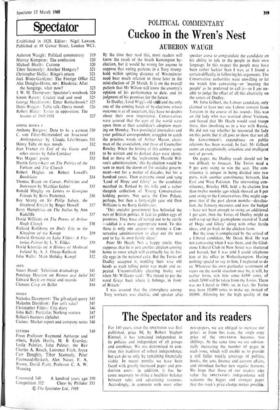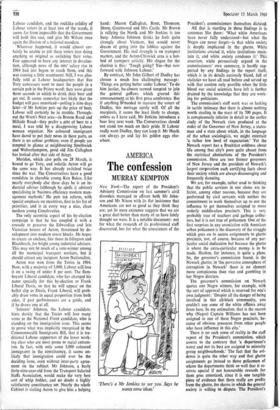Cuckoo in the Wren's Nest
POLITICAL COMMENTARY AUBERON WAUGH
By the time they read this, most readers will know the result of the South Kensington by- election, but it would be wrong for anyone to suppose that voting patterns in a Tory strong- hold within spitting distance of Westminster need bear much relation to those later in the mini-election of 28 March. It is on the overall pattern that Mr Wilson will know the country's opinion of his performance to date, and its judgment of his promises for the future.
In Dudley, Lord Wigg's old setillPand the only one of the coming batch of by-elections whose outcome is at all uncertain, they have no doubts about their own importance. Conservatives were assured that the eyes of the world were upon them at their candidate's adoption meet- ing on Monday. Two provincial journalists and your political correspondent struggled to catch the precious words of Arthur Mason. chair- man of the association, and those of Councillor Rowley. When the history of this century came to be written and its darkest days were identi- fied as those of the 'arch-enemy Harold Wil- son's administration,' this by-election would be seen to mark the doom of the socialist govern- ment—not for a matter of decades, but for a hundred years. Then everyone stood and sang `Land of Hope and Glory' as the candidate marched in, flanked by his wife and a rather sheepish collection of Young Conservatives holding posters. Not quite the Cow Palace, perhaps, but then a forty-eight year old Don Williams is no Barry Goldwater.
'This socialist government has befouled the nest of British politics. It laid its golden eggs of promises. They have all turned out to be sterile —addled is a more appropriate word. To this there is only one answer—to restore a Con- servative administration to clear out the nest and to lay its own fertile ideas.'
Poor Mr Heath. Not a happy simile. One supposes that he is just another chicken coming home to roost which will eventually lay its fer- tile eggs in the national cake. But the Tories of Dudley accepted it, nodding their wise old heads as each telling point was made and re- peated. Uncontrollable cheering broke out when Mr Williams said: 'We intend to put the word Great back where it belongs, in front of Britain.'
I was assured that the atmosphere among Tory workers was electric, and speaker after speaker arose to congratulate the candidate on his ability to talk to the people in their own language. In this respect the people may have been rather luckier than I was, as I found a certain difficulty in following his arguments. The Conservative authorities were unwilling to let me watch him canvassing—or 'meeting the people' as he preferred to call it—so I am un- able to judge the effect of all this electricity on the voters of Dudley.
Mr John Gilbert, the Labour candidate, only claimed to have met one Labour convert from Toryism in the course of his rounds. This was an old lady who was worried about Vietnam, and feared that Mr Heath would send troops there, thus involving us in a war with Russia. He did not say whether he reassured the lady on this point, but it all goes to show that not all the Government's expenditure on public relations has been wasted. In fact, Mr Gilbert seems an exceptionally articulate and intelligent sort of person.
On paper, the Dudley result should not be too difficult to forecast. The Tories need a 9 per cent swing to win the seat. The con- stituency is unique in being divided into two parts, with another constituency between, like East and West Pakistan. The intervening con- stituency, Brierley Hill, held a by-election less than twelve months ago which showed an 8 per cent swing to the Conservatives. One might sup- pose that if the past eleven months—devalua- tion, the January measures and now the budget —have not been enough to swing an additional 1 per cent, then the Tories of Dudley might as well wrap up their gramophone record of 'Land of Hope and Glory' along with other fertile ideas, and go back to the chicken farm.
But the issue is complicated by the arrival of a Liberal candidate, Mr Derek Bird. He was not canvassing when 1 was there, and the Glad- stone Liberal Club in New Street was shuttered and barred, but I was told I could telephone him at his office in Wolverhampton. Having nothing special to say to him, 1 neglected to do so. Whatever his own particular assortment of views on the world situation may be, it will, by earlier form, win him some 6,000 votes, of which 5,000 will be taken from the Tories. There was no Liberal in 1966; so, in fact, the Tories may have 15,000 votes to make up, instead of 10,000. Allowing for the high quality of the Labour candidate, and the rocklike solidity of Labour voters in at least two of the wards, it seems far from impossible that the Government will hold this seat, and give Mr Wilson once again the illusion of a national mandate.
Whatever happened, it would almost cer- tainly be unable to jolt these voters into doing anything so original as switching their votes.
Few appeared to have any interest in devalua- tion, although news of the MPs' salary rise in 1964 had just begun to reach them, and this was causing a little resentment. Still, I was glee- fully told at Labour headquarters that five Tory canvassers went to meet the people in a certain pub in the Priory ward; they were given three seconds in which to drink their beer and get out. It seems somewhat less likely that the budget will pass unnoticed—polling is nine days later—if Mr Jenkins puts up the price of beer, Labour will certainly be in trouble. Through- out the Wren's Nest area—in Broom Road and Hillside Road—they prefer a pint of beer to a meal, I was told by a disapproving Labour woman organiser. No coloured immigrants have dared to put their noses in these parts, so there is no colour problem; even if people are tempted to glance at neighbouring Smethwick and Wolverhampton, good old Jim Callaghan has looked after that side of things.
Meriden, which also polls on 28 March, is bound to go Tory, and volatile Acton will go the same way. It has already switched twice since the war. The Conservatives have a good candidate in cherubic young Ken Baker. Like nearly everybody else these days he is an in- dustrial adviser (although he spells it advisor) specialising in 'business efficiency modern man- agement methods.' He puts tax reform, with special emphasis on incentives, first in his list of priorities, and is in every way a nice, clean modern young Conservative.
The only eccentric aspect of his by-election campaign is that he has coupled it with a crusade to preserve the Edwardian and late Victorian houses of Acton, threatened by de- velopment into modern tower blocks. He hopes to create an enclave, like those in Islington and Blackheath, for bright young industrial advisers. This may not be much of a vote-winner among all the municipal transport workers, but it should attract any incipient Acton Nationalists.
Acton was won from the Tories in 1964. Now, with a majority of 5,000, Labour will lose it on a swing of under 8 per cent. The flam- boyant Liberal candidate, who has changed his name specially for this by-election to Frank Liberal Davis, so that he will appear on the ballot slip as Davis, Frank Liberal, will prob- ably draw votes in equal proportion from both sides, if past performances are a guide, and if he draws any at all.
'Johnnie' Johnson, the Labour candidate, hints darkly that the Tories will lose many votes to the National Front candidate, who is standing on the immigration issue. This seems to prove what was implicitly recognised in the Commonwealth Immigrants Bill, that it is tra- ditional Labour supporters of the lower work- ing class who are most prone to racial extrem- ism. In fact, with only some 3,000 coloured immigrants in the constituency, it seems un- likely that immigration could ever be the deciding issue, even without inter-party agree- ment on the subject. Mr Johnson, a burly forty-nine-year-old from the Transport Salaried Staffs Association, would make the very best sort of whip fodder, and no doubt a highly satisfactory constituency MP. Nearly the whole Cabinet is visiting Acton to give him a helping hand: Messrs Callaghan, Benn, Thomson, Shore, Greenwood and Mrs Castle. Mr Brown is rallying the North and Mr Jenkins is too busy. Johnnie Johnson thinks he feels quite strongly about Vietnam, but .would never dream of going into the lobbies against the Government. His real strength is on transport matters, and the Acton-Chiswick area is a hot- bed of transport activity. His slogan for the election is this: 'Tough going? Yes—but now forward with Johnson Labour.'
By contrast, Mr John Gilbert of Dudley has chosen a much less challenging message: `Things are getting better under Labour.' To do him justice, he• almost seemed tempted to join the general guffaws which greeted this announcement at his first press conference. But if anythingWm' teeded to reassure the voters of Dudley, this message surely will. Of all the marginals, it seems the least likely to change, unless as I have said, Mr Jenkins introduces a 'beer levy next week. The Conservatives should not stand too much on their pride. If Labour really want Dudley, they can keep it. Mr Heath can always go and lay his golden eggs else- where.











































 Previous page
Previous page